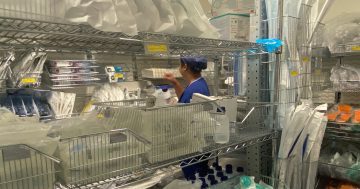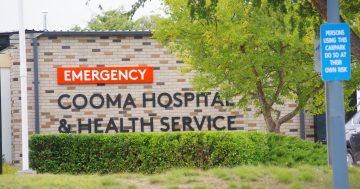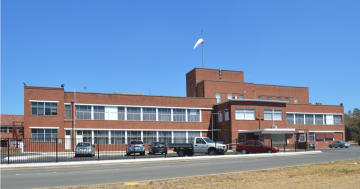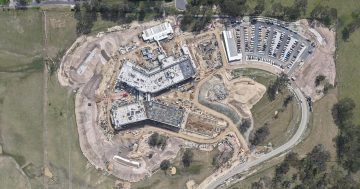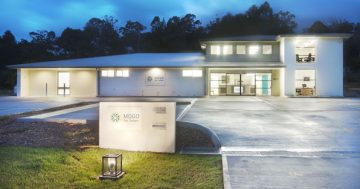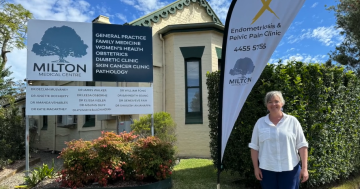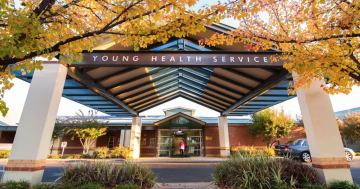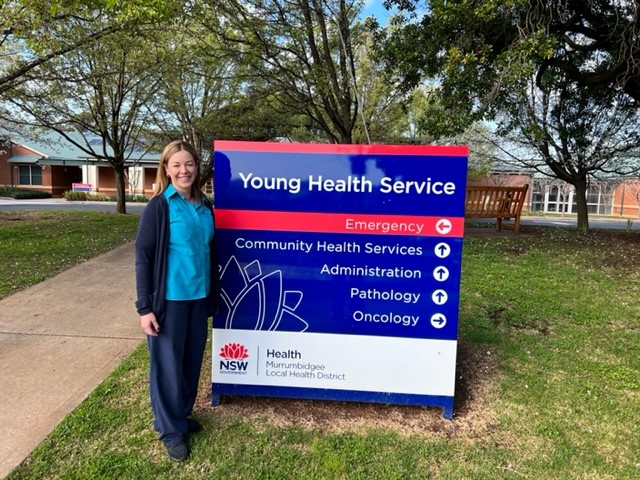
Melanie Lacey is making her mark in the Young Health Service. Photo: MLHD.
Young Health Service chief pharmacist Melanie Lacey originally moved for love but her other passion has proven just the right medicine for patients in the Hilltops region.
Melanie has conducted a whopping 2000 medication reviews for her patients over the past 12 months in her quest to empower people to actively engage and educate themselves about the medication they are taking.
“Murrumbidgee Local Health District has adopted the KNOW.CHECK.ASK global patient safety initiative, which encourages patients to talk to their health professionals about their medication,” she said.
“I think as patients, we sometimes forget that having our medication reviewed is an important step in our health care. What someone is prescribed a few months ago, a few years ago, may not be what the person needs now.
“I think it is just so important to educate, support and encourage the people within our communities to feel empowered about asking questions and raising concerns about their medication.
“It can be as easy as taking your medication list along to your pharmacist, your doctor’s appointment or even to the hospital if you are being admitted. You can also request a home medication review by a pharmacist through referral from your GP.”
Melanie says it is common to identify expired or incorrect medications or find that patients may be taking something their GP or health professional is not aware of, including things we tend to take without thinking, such as supplements and vitamins.
“It can sometimes be a real issue and impact negatively on health outcomes,” she said.
“Most weeks I identify someone who is taking medication that does not match what their GP thinks they are taking, which can be really alarming.”
As a pharmacist, Melanie says there is much she can do to ensure people are taking their medication without harm.
“Sometimes we can adjust things like dosages or medication choice, based on a person’s blood test results, so that is another really important part about understanding what we are taking,” she said.
“Things can change over time, as we age, or depending upon the other illnesses we may be dealing with.
“If we don’t have the information from the patient about what they’re thinking, what their concerns are, or what their side effects are, then we cannot determine what changes are needed.
“So it’s perfectly fine to talk with and question your doctor or pharmacist about what medication you are taking, if you have any concerns. That is why medication reviews should be as normal as having your blood pressure taken or booking your yearly health check-up.”
Originally from Dubbo, Melanie found her way to Young more than 23 years ago, meeting her now husband while studying pharmacy at the University of Sydney.
“My husband is from Young, and he has generations of family who live here. It just made sense to move here once we started a family. Regional areas have so much to offer and a much quieter, more connected lifestyle,” Melanie said.
“I was fortunate to secure employment at a community pharmacy within three days of deciding to move to Young and eventually began locum work, including at the hospital.
“It was great timing, because while I love the intimacy of working in a community pharmacy, I enjoy the clinical input I can contribute working within our hospital.”
Melanie feels that her position as chief pharmacist at Young Health Service is a great example of the multidisciplinary approach to patient care in a smaller regional facility.
“From a pharmacist perspective, the hospital in Young is a great place to work because I can collaborate easily with all the health professionals and patients around me. We are all about putting the patient at the centre of their care,” she said.
“That is great news for patients, because while we hear buzzwords like multidisciplinary and positive patient outcomes, at Young Health Service we get to see this in practice daily, with people and patients who we know, who are part of our community and really benefiting from the open channels of communication that we have.
“We are fortunate to have a bonded healthcare team, the doctors, the nurses and allied health professionals. We really all do work as a team and have so much opportunity to talk face-to-face and consult each other regarding our patients and appropriate care.
“We are not restricted to just formal multidisciplinary rounds but can also go and talk to the patients, and really involve them in their health care and ability to make informed choices.
“If I am concerned about something, I can address it quickly and easily with both my patient and their relevant health professionals. We can start to action things on the spot.”







